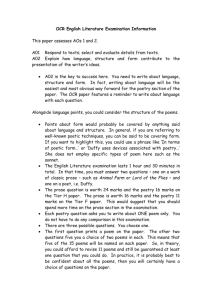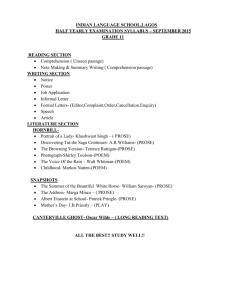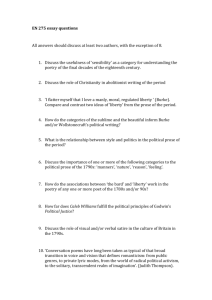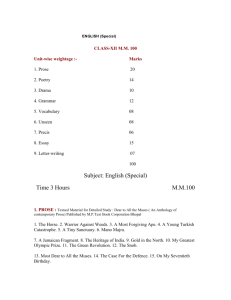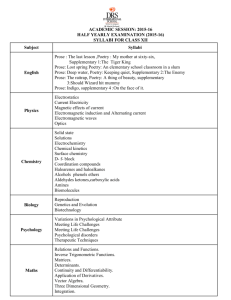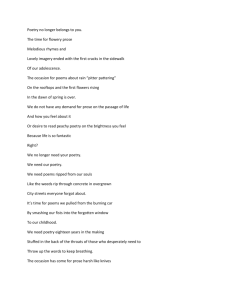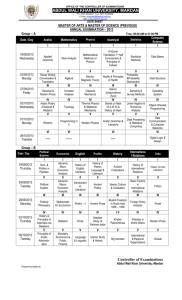The Expanse: Self-Consciousness and the Transatlantic Prose Poem
advertisement
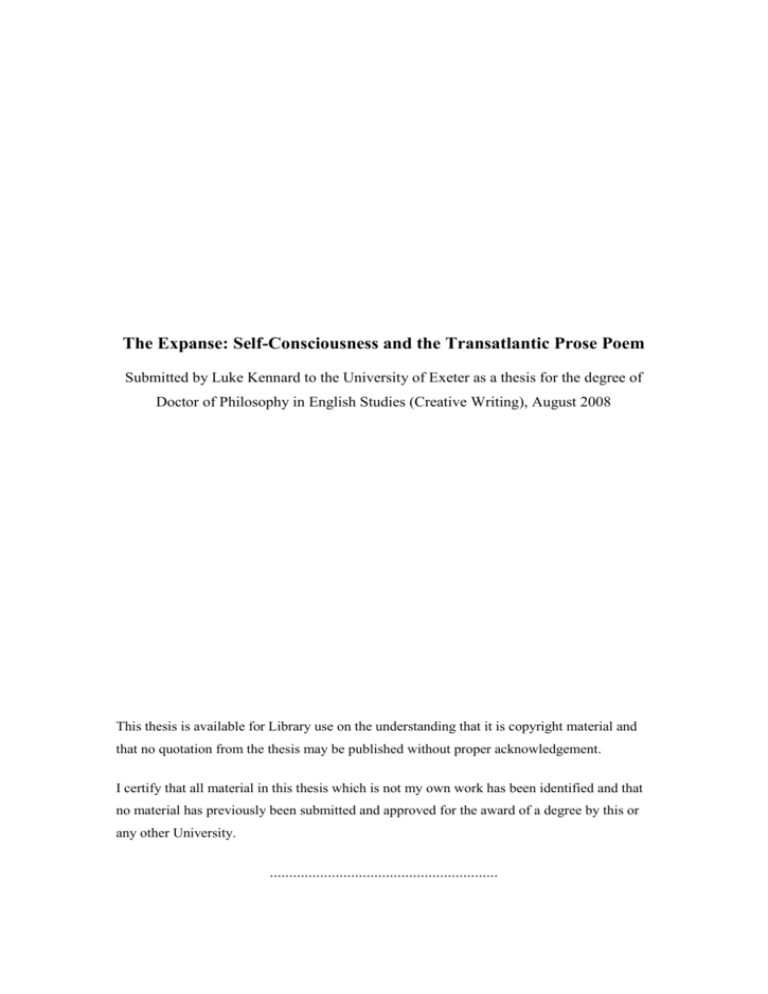
The Expanse: Self-Consciousness and the Transatlantic Prose Poem Submitted by Luke Kennard to the University of Exeter as a thesis for the degree of Doctor of Philosophy in English Studies (Creative Writing), August 2008 This thesis is available for Library use on the understanding that it is copyright material and that no quotation from the thesis may be published without proper acknowledgement. I certify that all material in this thesis which is not my own work has been identified and that no material has previously been submitted and approved for the award of a degree by this or any other University. ........................................................... ABSTRACT This work consists of a portfolio of creative work in the form of verse and prose poems, The Dusty Era, preceded by a thesis, ‘The Expanse: Self-Consciousness and the Transatlantic Prose Poem’, arguing for a serious analysis of humour within the form of prose poetry. Chapter 1 introduces the form of prose poetry and the idea of self-consciousness as methodology through the book-length prose poem In Parenthesis (1937) by David Jones. Chapter 2 concerns Seamus Heaney’s Stations and Geoffrey Hill’s Mercian Hymns, two prose poem sequences from the early 70s, both of which cite In Parenthesis as their primary influence. The works are discussed in terms of their reactions to Jones, arguing that they largely excise self-consciousness in favour of poetic self-mythology and aggrandisement, whereby the events of a poet’s life are elevated to the significance of historical events. The chapter concludes by looking at Heaney’s recent return to the form in his 2006 collection District and Circle. In Chapter 3 John Ashbery’s Three Poems is read alongside Samuel Beckett’s novel The Unnamable and through Martin Heidegger’s The Question Concerning Technology. Antecedents are sought in the prose poetry of Baudelaire and Kafka and the parallel themes of judgement and Christian imagery are traced through Three Poems and W. H. Auden’s The Orators. In Chapter 4 the process poetry of The Orators leads to the identification of a hybrid form, the poem-as-essay (or essay-aspoem), analysed through the work of Canadian poet Anne Carson, whose prose poetry simultaneously complements and subverts her research as a classicist. Chapter 5 concerns the English poet John Ash, in particular his technique of inverting his standard poetic voice within his travelogue prose poems. This is traced back to Bashō’s 16th century travelogues, as self-conscious and self-referential as anything which is today classed as postmodern. In conclusion the thesis assesses the work of Lee Harwood as a poet who encapsulates the central arguments of self-consciousness, humour and transatlanticism within his prose poetry while remaining stylistically unaffiliated with a specific movement. CONTENTS ‘The Expanse: Self-Consciousness and the Transatlantic p. 4 Prose Poem’ The Dusty Era: Portfolio of prose poetry and verse p. 148 The Expanse: Self-Consciousness and the Transatlantic Prose Poem PhD Thesis CONTENTS Introduction p. 6 Chapter 1 – “Modulated Ambiguity”: David Jones’s In Parenthesis p. 19 Chapter 2 – Excavation and Self-Aggrandisement: Seamus Heaney’s Stations and Geoffrey Hill’s Mercian Hymns p. 38 Chapter 3 – “Oh, do not ask, ‘What is it?’”: Judgement, Absurdity and Ashbery’s Three Poems p. 62 Chapter 4 – “The Difference Between a Volcano and a Guinea Pig”: Form and Error in Anne Carson p. 84 Chapter 5 – The Inverted Tourist: John Ash and the New Symbolism p. 107 Conclusion p. 129 Works Cited p. 142 ACKNOWLEDGEMENTS FOR CREATIVE PORTFOLIO: ‘Ear / Eyes / Mouth’ appeared in the second Tall Lighthouse Review: Automatic Lighthouse. ‘The Elements’ first appeared in Sentence, issue 5. ‘My Friend’, ‘Four Neighbours’, and ‘Morals’ first appeared in Succour, issues 4-5. ‘Our Time in Office’ first appeared in 14 Magazine. ‘I Am No Longer Your Pilot’ first appeared in The Allotment: New Lyric Poets. ‘The Journalist’s Prayer’, first appeared in Maquette Magazine. ‘Plethoric Air’ first appeared in Exultations and Difficulties. ‘Daughters of the Lonesome Isle’ first appeared in The Flying Post. ‘Repetition’ and ‘Salesman’ first appeared in Shadow Train. ‘Autumn Collection’ has appeared as the Saturday Poem in The Guardian Review. ‘The Murderer’ has appeared in various forms in Echo:Location, TransitionTradition, The Guardian and The Independent. ‘The Dusty Era’ appeared in The Manhattan Review. ‘Gravedigger: The Movie’, ‘Grapefruit’ and ‘Variations on Tears’ have appeared in Bat City Review. Many poems in this collection were originally published in The Harbour Beyond the Movie (Salt Publications, 2007) which was shortlisted for the 2007 Forward Prize for Best Collection. Others will be published in the forthcoming Migraine Hotel (Salt Publications, 2009). The full sequence of Murderer poems appeared in The Forward Book of Poetry 2008.

